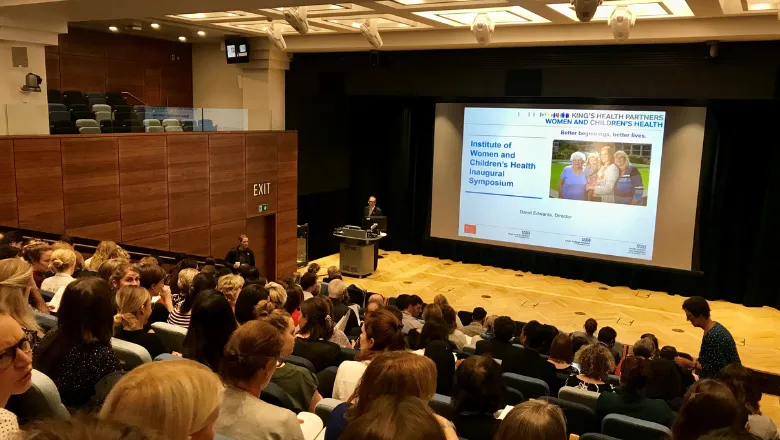We’re building towards London becoming a health data capital of the world.
Professor Sir Robert Lechler, Director of King’s Health Partners
11 June 2019
New institute to boost women's and children's health
The Institute of Women's and Children’s Health Inaugural Symposium brought together leading clinicians and researchers to tackle the most important healthcare needs for all women and children.

On Monday 10 June, an Inaugural Symposium to launch the King’s Health Partners Women’s and Children’s Health Institute was held to address the most important healthcare needs and improve outcomes for women and children locally, nationally and internationally.
The foundations of lifelong health are built in utero, at birth and in childhood. It’s why we need to recognise the link between women’s and children’s health to prevent disease and ultimately save lives.
Traditionally, health and disease of women and children have been treated as separate disciplines both in research and in academic and clinical education and training. This new Institute aims to address the important diseases affecting large numbers of patients across the life-course from before birth to adulthood, and on the combined effects of mental and physical disease.
The Institute will facilitate collaboration between the NHS and King’s to develop these themes and provide support for developing new projects. Key initiatives include the creation of a dedicated Clinical Trials Unit, development of Clinical Research Facilities, support for funding applications and teaching, and developing novel collaborations across King’s Health Partners.
The symposium held at Bush House was an opportunity to celebrate and learn about the Institute and find out what it can do to support your work and affect positive change across the globe.
Director of King’s Health Partners Professor Sir Robert Lechler opened the symposium and promoted the Institute’s role in improving technology, building a fit-for-purpose workforce and using data to better understand disease cause and prevention.
The Institute will build on the strong reputation of King’s Health Partners women and children’s medicine and medical research. It will also provide a comprehensive range of undergraduate and postgraduate education and training opportunities in women and children’s health. It will be based from St. Thomas' on the 5th floor at Becket House, featuring a hot-desking space for staff and students. New Institute Manager, Nandi Simpson, will lead the application of grants, provide teaching support and help build the team going forward – with several recruitments in the pipeline.
Professor of Children’s and neonatal medicine, David Edwards, discussed how the Institute will identify and fill gaps in the market – such as life course approaches to women’s and children’s research and clinic trials management – while driving further collaboration.
In the UK, and globally, the neonatal period remains the most dangerous. Keynote speaker and Chief Scientific Adviser for the Department of Health and Social Care, Professor Chris Whitty, said the effects of the period from conception to adulthood is often lifelong, impacting both physical and mental health.
In high-income countries, Professor Whitty argued that most positive change will come from science, and its application. While in low-income countries, reform will often result from socioeconomic development, with science still playing a major role.
The disconnect between maternal and child health has been a barrier to progress. Future changes in maternal and child health will come from science and external trends.
Chris Whitty, Chief Scientific Adviser for the Department of Health and Social Care
With an outstanding track record of transforming the lives of women and children in Afghanistan with UNICEF, newly appointed Professor of Child Health Karen Edmond shared her experiences from the field.
Professor Edmond emphasised the importance of mobile health teams, community health work home visits, motorcycle mini-ambulances and maternity waiting rooms in disadvantaged communities.
It is possible to improve access and service delivery using low cost interventions for most disadvantaged mothers and children; including services that will improve mortality, morbidity and neurodevelopment.
Karen Edmond, Professor of Child Health
She explained with transport incredibly scarce in highly disadvantaged communities, these interventional tools and delivery channels are vital to ensure women get the care they need, close to home.
As well as implementing personal health records in Afghanistan, Professor Edmond argued mobile flexible services should be strengthened to tackle the inequities and burden between populations.
Disadvantaged communities are also faced with the burden of pre-eclampsia. It’s why Professor of Obstetrics Andrew Shennan worked tirelessly to create a device to measure vital signs, including blood pressure, during pregnancy.
Pregnant women can reduce the risk of convulsions in pregnancy by regular check of blood pressure. The semi-automated, hand-held, upper arm device has been critical in saving women’s lives. Working alongside Red Cross, approximately 20,000 cradle devices have now been implemented to more than 35 countries.
